
views
Setting the Record Straight

Know that nothing you do will ever make rape your fault. Before you even start thinking about preventing a potential rape, you have to understand that if you are raped, it is 100% the rapist's fault and that nothing you did, wore, or said could have caused you to be raped. There is no such thing as "asking for it," and anyone who leads you to believe otherwise is deeply misguided. Though you can certainly take measures to improve your chances of avoiding danger and staying safe, in the end, nothing you can do can "cause" you to be raped.
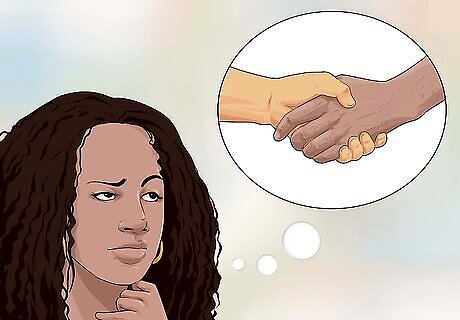
Understand that the best thing that can be done to prevent rape is to prevent people from raping. In today's culture, there are many things that can be done to prevent rape, and it starts with the way women are perceived. If we work, as a society, to raise people who are respectful of others and stop contributing to a culture that objectifies and belittles vulnerable groups and women constantly, then we can slowly start to turn things around. Sometimes, adolescent boys think "rape jokes" are funny and that it's okay to joke around about sexual assault, and it's important to let them know that this is not the case. Any gender can be raped, but society has taken into itself that men "can't possibly be raped", and so most men are ashamed and afraid if they speak out. Many people feel that giving people guidelines about things that can be done to stay safe actually shames them and makes them feel like avoiding rape is all about having people act "the right way," and that if they make a misstep, it is basically their fault that they got raped. This is not the intention of this article. This article intends to empower people by giving them some sensible advice on how to avoid danger. However, women are not the only gender to be raped. Men can be raped, but it just isn't as prevalent. Society doesn't believe "petite little women" can rape "big strong men", and yet it still happens.

Don't ever stop living your life. It can be overwhelming to read the advice about preventing rape. You'll start to feel like there's no place you're safe -- not your grocery store parking lot, not a restroom at a bar, not your car, and not even your own home. You might start to wonder where one can go to be completely safe from rapists, but you can't think like this. Though you should take some precautions, you can't be afraid to leave home by yourself, to be outside late at night, or to go to some of your favorite places. You can still enjoy your life and feel secure without the constant paranoia that you may feel after reading about how to prevent rape.

Know that the majority of rapes are committed by a person the victim knows. The statistics vary, but it is said that only 9%-33% of rapists were complete strangers to the victim. This means that the vast majority of people are raped by men that they know, whether they are friends, people they are dating, co-workers, acquaintances, or even family members. This means that it's far more likely for a person to get raped by someone they know instead of a stranger in a dark alley. Therefore, while it's important to take precautions when you're alone, you shouldn't completely let your guard down when you're with people you know. When you're in a social situation with someone you know, be extra careful and don't fully let your guard down unless you feel truly safe with the person. Even then, rape can occur. Know that if your gut tells you the situation is not okay, you should leave as soon and as safely as you can. Date rape is also extremely common -- according to one study, nearly 1/3 of rapes are committed by a date. When you're dating someone new, understand that no absolutely means no, and don't ever let anyone make you feel guilty about knowing what you do and don't want. Don't be afraid to communicate your needs clearly and loudly, if necessary.
Keep in mind that anyone can be raped. Rape can and does strike anyone at anytime. Age, social class, sexual orientation, gender identity, ethnic group and has no bearing on the person a rapist chooses to attack. Research data clearly proves that a way a person dresses and/or acts does not influence the rapist's choice of victims. Their decision to rape is based on how easily they perceive their target can be intimidated. Rapists are looking for available and vulnerable targets. Statistics were obtained from various sources including the study Rape in America; 1992, National Victim Center, The Federal Bureau of Investigations and the National Crime Survey.
Staying Safe in Social Situations

Be aware of your surroundings at all times. Parking lots and parking garages are two of the sites that are most often targeted by attempted rapists. These people are predators, so view your surroundings carefully. If you are in a parking lot and feel someone is following you, start making noise -- talk to yourself loudly, talk to an imaginary person, or pretend to talk on your cell phone. The louder the potential victim, the more the predator is apt to freeze. Scope out your surroundings during the day. Whether you're working in a new place or new to campus, make sure you learn the safest way to walk from place to place. This means staying under well-lit lights, walking in places where people tend to be around, and even being near blue light emergency call boxes, if your campus has them.

If you're in college, know that the majority of rapes happen during the first few weeks of the year. According to the Department of Justice, the majority of rapes in college occur during the first few weeks of your freshman and sophomore years. These are the riskiest days because people are just getting to know each other, there are a lot of new people around, along with an abundance of alcohol. Though this shouldn't keep you from having fun or leaving your dorm room, you should be extra cautious about meeting new people, and make sure that you stick with your friends and your sound judgment.

Don't leave your drink unattended. Treat your drink like a $100.00 bill. Don't let anyone hold your drink. Avoid anything that somebody gives you. It could be counterfeited, or someone could have dropped drugs into it. Always hold, keep and get your own drinks.Tip: Keep your hand over the top of your drink because it's easy to drop something into it. Do not accept a drink from a date unless the bartender or waitstaff delivers it straight to you. Even if you're pretty sure the drink you left on the other side of the room was your drink, it's a much safer bet to buy another one.

Drink responsibly. Again, this does not mean that drinking irresponsibly makes it your fault if a rapist approaches you; it does, however, make you more vulnerable and susceptible to unwelcome attacks. Make sure not to drink more than 1 drink per hour (which means a glass of wine, a beer, or one shot of alcohol) and to stay in control of your mind and body as much as you can. Do not opt for the sketchy punch or jungle juice in a frat house; do not let anyone who is not a bartender make you a mixed drink because it is likely to be very, very strong.

Stick with your friends. Wherever you go, show up with a group of friends and leave with that group of friends. Even if you and your friends have ended up at different parts of the party, always know where your friends are and make sure that they see where you are, too. Keep in touch with your friends, make eye contact, and make sure you're on the same page. Your friends should have your back if they see you with a person whose company you don't want, and you should do the same. Don't leave your friend out with a person they've met for the first time, either, especially if there has been alcohol involved.
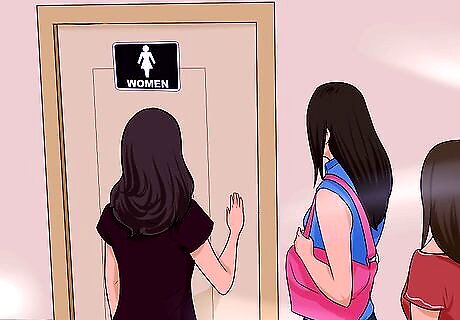
Stay safe at clubs. Clubs may be so loud that people may not hear you cry for help. If you're out at a club, make sure you stick with your friends, go to the bathroom in packs, and that your friends know where you are at all times.
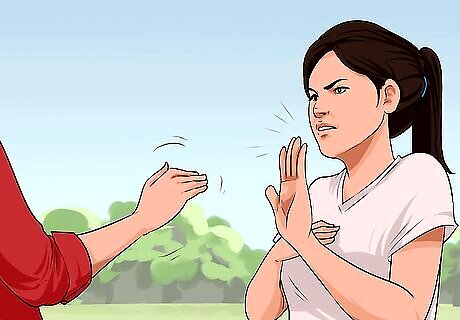
Be assertive. If somebody is giving you unwanted attention, tell them to back off. There is no need to be polite when somebody is making unwanted sexual advances. Firmly tell the person thanks, but no thanks, you're not interested. This may be more difficult if it's someone you actually know and care about, but it will still be possible. Once you get the message across, the person will be much more likely to move on. If someone unknown tries to approach you, try de-escalating the situation by saying, "I'm sorry, but I can't help you." Continue to say this if they keep pursuing you.

Keep personal information private. Don't advertise your info verbally or on the Internet. Also, be very wary of meeting up with anyone whom you meet on the Internet. There is very rarely a good reason to meet up with a person whom you have never met in person, or who talks you into meeting-up when you are hesitant. If you think you must do so, bring someone else, preferably a friend who is older and meet the person in a public place.
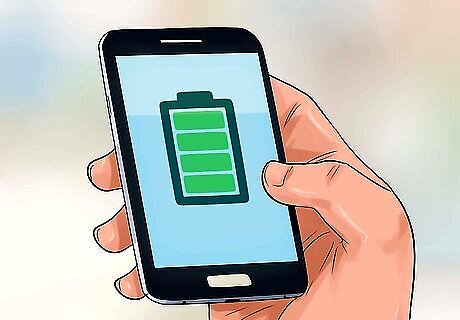
Always keep your phone charged. Don't step out with an almost-dead phone. It can be your saving grace, whether you need to call the cops or call your friends and ask them for help. Make sure you do this before you step out for the night, whether you're alone or with friends. You can even make a habit of bringing a charger out with you if you tend to forget it.
Staying Safe When You're Alone
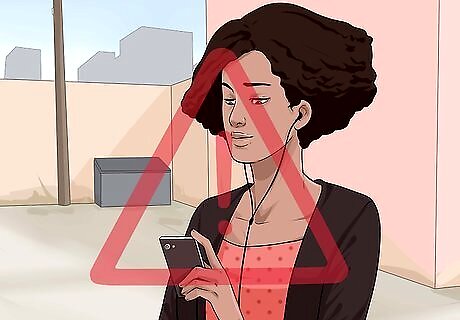
Be careful about using technology when you're out alone. Let's get this straight: you should not stop enjoying your life or doing the things you love to do because of fear that you're going to be raped and assaulted. If you love running with your iPod in, then fine, but be extra careful and look around your surroundings at all times, trying to run near where the people are. If you're walking in a dark parking garage or parking lot, then stay focused on where you need to go instead of playing around with your iPod or your iPhone. Attackers look for the weakest victims. If they see that you are highly vigilant and walking with purpose, they will be less likely to attack you than if you're texting and not looking where you're going, or rocking out to your new favorite song on your phone.

Learn to trust your gut instincts. If you feel uneasy or unsure in any way, it is in your best interest to get away and get help. Use your instincts and be aware of your freeze instinct. If you're in a situation where you're alone and suddenly run into or see someone else who just makes you feel unsafe, then change action as quickly as possible. If you're really getting the sense that you're unsafe, then it's important to stay calm, move quickly, and to go to the place where you're the most likely to find other people. If you're walking down a dark street and have the feeling that the person behind you is following you, cross the street in a diagonal and see if they do the same. If so, then walk towards the middle of the street (but not so much that you can get hit by a car) so that you're more likely to be seen by an oncoming car that could help you and scare away the potential attacker.
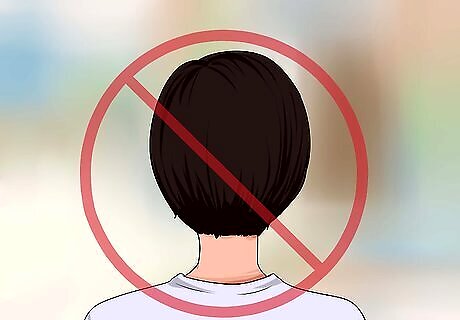
Don't cut your hair just to deter a rapist. Sure, a lot of people will tell you that rapists go for people with long hair or ponytails because they are easier to grab onto. Does this mean you should rock the short-haired bob so people are less likely rape you? Of course not. (Unless you want short hair, of course.) Don't let a potential rapist deter you from looking how you want to look, and don't ever blame yourself for attracting the wrong kind of person.

Don't change your dressing style to deter rapists. Many people will tell you that you're more likely to get raped if you wear clothes that will be easier to remove, or to "cut away" with a pair of scissors. This includes thin skirts, thin cotton dresses, and other light and short clothing. They'll say that wearing overalls, jumpsuits, and rompers are the best, and so are pants that have zippers instead of elastic waists. They'll also say that belts keep your clothes in place, that layers help deter rapists, and so on. While this may not be exactly false, you shouldn't have to feel like you need to wear bulky overalls, combat boots, or scuba gear to avoid getting raped. In the end, it's up to you to decide what you want to wear, and you shouldn't feel like the light clothes you're wearing are making you more "prone" to rape. Some people will also say that dressing provocatively invites rapists. Avoid this kind of anti-humanist thinking as much as you can.

Carry defensive items only if you know how to use them. Remember, any "weapon" that could hurt a potential attacker can be used against you if you are not well trained and comfortable with it. If you are going to carry a handgun, make sure to take classes in its use, practice often at a firing range, and apply for a concealed weapons permit; if you carry a knife, take a course in the most effective way to use it. Remember that even an umbrella or purse can be used as a weapon against an attacker, and has less chance of being turned against you.
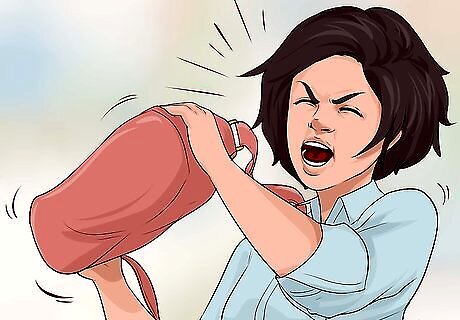
Yell, shout, and draw attention to yourself. Attackers usually have an idea of how the attack will happen. Disrupt that idea. Fight like a furious cat, and yell loudly and strongly. You can also buy a small personal alarm keychain that will emit a high pitch siren like a car alarm when its pin is pulled, similar in design to a grenade.
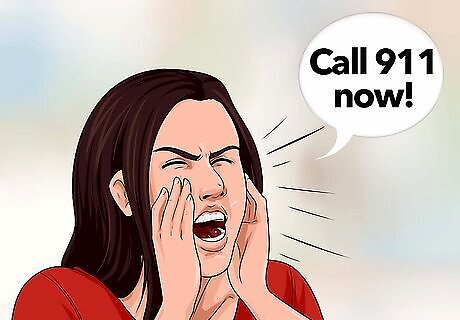
Yell "Call 911 now!" (or whatever your local emergency number is). Yelling this can have the double effect of scaring away the attacker and getting other people involved. If you yell these words, people around you or nearby are likely to come running to your aid. Studies have also suggested this effective strategy: pointing at an individual bystander and saying "You, in the white shirt, I need your help now! I'm being attacked!" Tell it like it is, and point to an individual. Some studies show that yelling "Fire!" instead of "Help!" or "Call 911!" can actually be more effective in getting the attention of bystanders. You can try this tactic as well, but others feel that it may be difficult to remember to yell fire instead of to call for help in the moment.
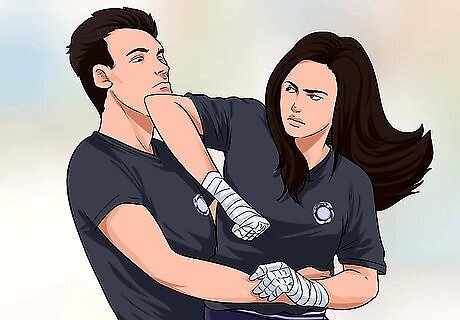
Take a basic self defense course. One course you can take is called Rape Aggression Defense (RAD). Contact your local police office for programs such as RAD. These programs can teach you many effective methods of attack, from hitting to eye gouging. Having these skills under your belt will make you feel more safe when you're walking alone at night.
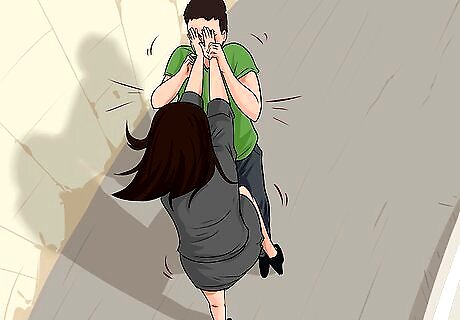
Learn "SING". This stands for Solar Plexus-Instep-Nose-Groin, the four attack points you should focus on if grabbed from behind. Elbow them in the solar plexus (also known as the gut), stomp on their foot as hard as you can, and when they let go, turn around and jam the palm of your hand into their nose in an upward motion, then finish with a knee to the groin. This may disable your assailant long enough for you to get away. The eyes and throat are also great weak points to hit.
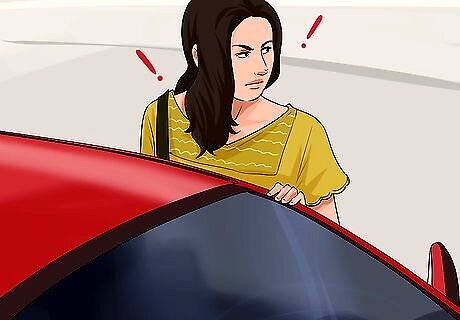
Walk into your house with confidence. Don't dilly dally in your car or stand on the street rifling through your purse. Leave your car with everything you need. Practice being careful when going into your house or car because someone could easily push you in and lock the door behind you. Be aware of your surroundings; carry your keys ready in your hand and look around you before opening the door.

Walk like you know where you're going. Look up as you walk and stand up straight; pretending as though you have two big panthers on either side of you as you walk may sound silly, but it can help boost confidence. Attackers are more likely to go for those who they think cannot defend themselves. If you look weak or like you're not sure where you're going, you're much more likely to catch an attacker's attention. Even if you really are lost, don't walk as if you are.

Notice and leave identifying marks. A large bite mark on their face, punctured eyeball, deeply scratched leg, ripped out piercing etc. is easily identifiable, as are memorable tattoos, etc. Think kill. Go for weak spots like eyes (poke hard), nose (hard upward motion with the lower part of your open hand) genitals (grab really tightly and squeeze or punch hard) etc. to make sure the person's hands aren't free to punch or hold on to you and you can run for it. If you are in a place where you can't run, notice your surroundings and leave a mark on them if you can. Rapists have been caught because their victims left identifiable teeth marks, nail marks, or DNA in the cars or rooms where they were assaulted.

Make eye contact if you are being followed by someone who may be a potential threat. An attacker may be less likely to strike if they think you will be able to clearly identify them. Though you may be scared and this may feel like the last thing you want to do, it could ensure your safety.
Keeping Other People Safe
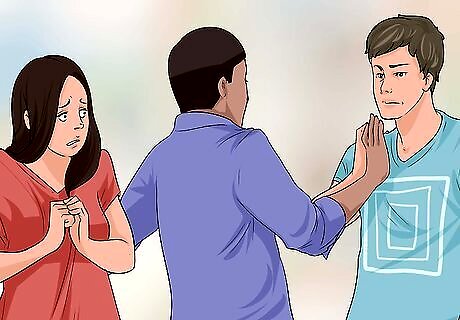
Don't be afraid to intervene. Sticking up for other people can go a long way toward preventing potential rape. It's not always easy to intervene in uncomfortable situations, but it's worth the awkwardness when you stand the chance to prevent rape from occurring.

Watch the potential victim. For example, if you're at a party and you see a person trying to make a move on your friend who's intoxicated, walk over and make it clear you're keeping an eye on him/her. Find an excuse to insert yourself into the situation. "I brought you some water." "Do you want to get some air?" "Are you doing okay? Would you like me to stay with you?" "I love this song! Let's go dance." "My car is out back. Would you like a ride home?" "Jessie! Oh my gosh, it's been so long! How have you been?" (This works even on strangers. Unless they're too drunk to understand, they'll happily play along in order to get rid of the predator.)

Address the potential rapist. You may wish to confront them, or simply distract them. "Leave her alone. She can hardly stand on her own. My friends and I will walk her home." "Hey, he said no. He's clearly not into it." "Excuse me, sir? Your car is being towed."
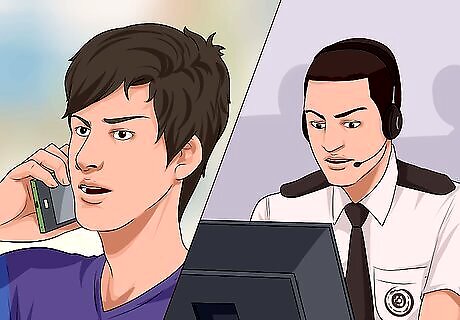
Get backup if you need help dealing with the situation. Simply having a few people present could be enough to deter someone from attempting rape. Tell the host or bartender what is going on. Enlist friends (your own, or friends of one of the parties). Call campus safety, tell a security guard, or call the police.
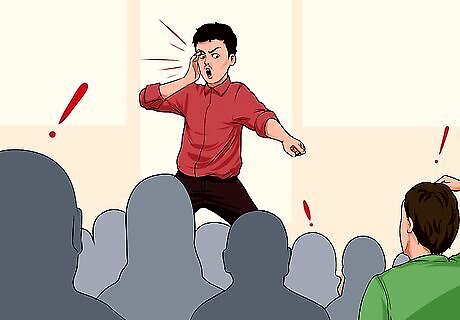
Create a disturbance. If you don't know what else to do, bring a social gathering to a halt. Turn off the lights, or turn off the music. This can distract or embarrass the would-be rapist, and call attention to the fact that something is wrong.

Don't leave your friends behind at parties. If you go to a party with a friend, don't leave the person behind when you're ready to go. Leaving someone behind, especially with a group of people who are just acquaintances or strangers, puts that person in a vulnerable position. This is especially true when there are alcohol or drugs involved at the party. Before you leave, locate your friend and see how they're doing. Don't leave unless you're confident the situation is safe and they'll be able to get home without a problem. If your friend seems drunk or on their way to getting there, see if you can convince them to come home. If they refuse, stay at the party until they're ready to go.
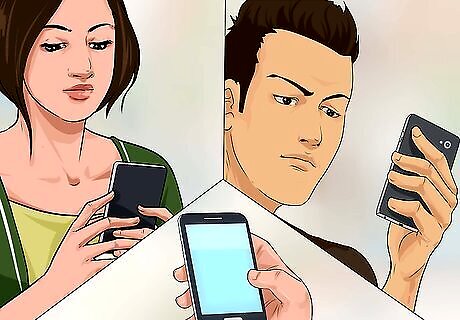
Use a buddy system to make sure everyone gets home safely. Taking a simple precaution like having everyone text each other when they're back home is a good way for friends to protect one other. For example, if you meet up late at a coffee shop and your friend bikes home in the dark, exchange texts or call each other when you're home. If you don't hear from your friend, find out what's going on.
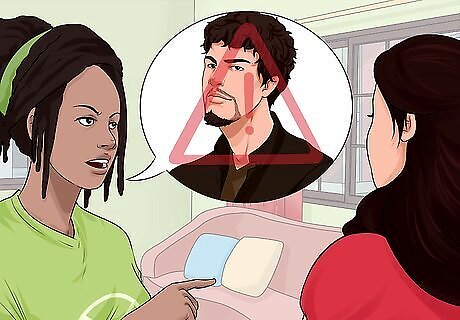
Speak up if you know someone to be a rapist. If your friend is about to go on a date with someone you know to be a rapist, saying something about it is the right thing to do. Whether there are rumors going around that the person raped someone, or you have firsthand knowledge on the matter, you don't want the person to be able to hurt someone else. If you were personally attacked by the person in question, it's up to you to decide whether you want to publicly "out" the rapist. It's undoubtedly a very brave act, but your life will be deeply affected by your decision, so it's not a choice most people make lightly. However, even if you don't want to make things public, warning people you know against spending time alone with the person will help prevent potential rape.
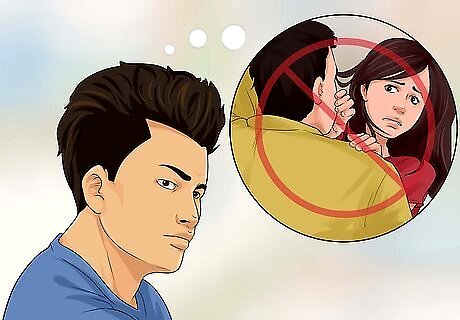
Do your part to get rid of rape culture. This is important for all people. Preventing potential rapes ultimately depends on educating people on rape and taking a stand against it. Even when it's just you and your friends, don't say degrading things about people or make jokes about rape. When people see other people empathizing with minority groups or women that have been raped or sexually assaulted, they may be more likely to do the same themselves.











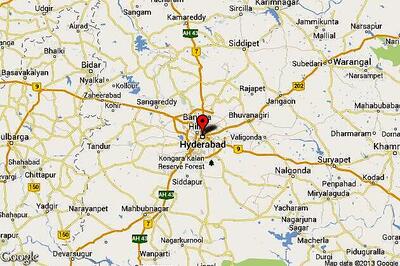
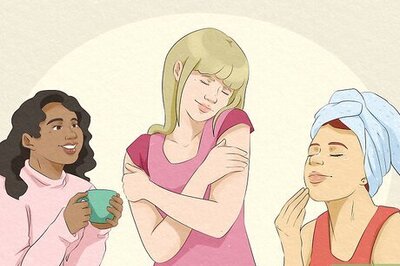

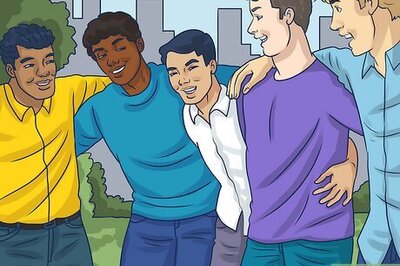





Comments
0 comment